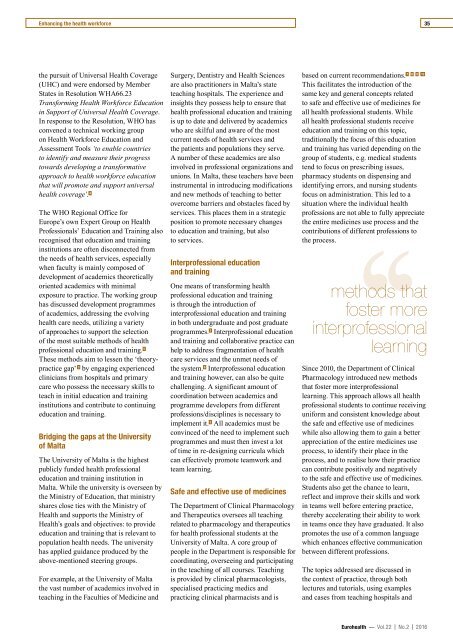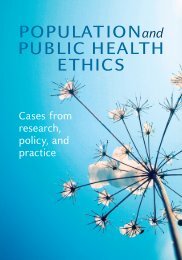EUROHEALTH
Eurohealth-volume22-number2-2016
Eurohealth-volume22-number2-2016
Create successful ePaper yourself
Turn your PDF publications into a flip-book with our unique Google optimized e-Paper software.
Enhancing the health workforce<br />
35<br />
the pursuit of Universal Health Coverage<br />
(UHC) and were endorsed by Member<br />
States in Resolution WHA66.23<br />
Transforming Health Workforce Education<br />
in Support of Universal Health Coverage.<br />
In response to the Resolution, WHO has<br />
convened a technical working group<br />
on Health Workforce Education and<br />
Assessment Tools ‘to enable countries<br />
to identify and measure their progress<br />
towards developing a transformative<br />
approach to health workforce education<br />
that will promote and support universal<br />
health coverage’. 4<br />
The WHO Regional Office for<br />
Europe’s own Expert Group on Health<br />
Professionals’ Education and Training also<br />
recognised that education and training<br />
institutions are often disconnected from<br />
the needs of health services, especially<br />
when faculty is mainly composed of<br />
development of academics theoretically<br />
oriented academics with minimal<br />
exposure to practice. The working group<br />
has discussed development programmes<br />
of academics, addressing the evolving<br />
health care needs, utilizing a variety<br />
of approaches to support the selection<br />
of the most suitable methods of health<br />
professional education and training. 5<br />
These methods aim to lessen the ‘theorypractice<br />
gap’ 3 by engaging experienced<br />
clinicians from hospitals and primary<br />
care who possess the necessary skills to<br />
teach in initial education and training<br />
institutions and contribute to continuing<br />
education and training.<br />
Bridging the gaps at the University<br />
of Malta<br />
The University of Malta is the highest<br />
publicly funded health professional<br />
education and training institution in<br />
Malta. While the university is overseen by<br />
the Ministry of Education, that ministry<br />
shares close ties with the Ministry of<br />
Health and supports the Ministry of<br />
Health’s goals and objectives: to provide<br />
education and training that is relevant to<br />
population health needs. The university<br />
has applied guidance produced by the<br />
above-mentioned steering groups.<br />
For example, at the University of Malta<br />
the vast number of academics involved in<br />
teaching in the Faculties of Medicine and<br />
Surgery, Dentistry and Health Sciences<br />
are also practitioners in Malta’s state<br />
teaching hospitals. The experience and<br />
insights they possess help to ensure that<br />
health professional education and training<br />
is up to date and delivered by academics<br />
who are skilful and aware of the most<br />
current needs of health services and<br />
the patients and populations they serve.<br />
A number of these academics are also<br />
involved in professional organizations and<br />
unions. In Malta, these teachers have been<br />
instrumental in introducing modifications<br />
and new methods of teaching to better<br />
overcome barriers and obstacles faced by<br />
services. This places them in a strategic<br />
position to promote necessary changes<br />
to education and training, but also<br />
to services.<br />
Interprofessional education<br />
and training<br />
One means of transforming health<br />
professional education and training<br />
is through the introduction of<br />
interprofessional education and training<br />
in both undergraduate and post graduate<br />
programmes. 3 Interprofessional education<br />
and training and collaborative practice can<br />
help to address fragmentation of health<br />
care services and the unmet needs of<br />
the system. 6 Interprofessonal education<br />
and training however, can also be quite<br />
challenging. A significant amount of<br />
coordination between academics and<br />
programme developers from different<br />
professions/disciplines is necessary to<br />
implement it. 3 All academics must be<br />
convinced of the need to implement such<br />
programmes and must then invest a lot<br />
of time in re-designing curricula which<br />
can effectively promote teamwork and<br />
team learning.<br />
Safe and effective use of medicines<br />
The Department of Clinical Pharmacology<br />
and Therapeutics oversees all teaching<br />
related to pharmacology and therapeutics<br />
for health professional students at the<br />
University of Malta. A core group of<br />
people in the Department is responsible for<br />
coordinating, overseeing and participating<br />
in the teaching of all courses. Teaching<br />
is provided by clinical pharmacologists,<br />
specialised practicing medics and<br />
practicing clinical pharmacists and is<br />
based on current recommendations. 7 8 9 10<br />
This facilitates the introduction of the<br />
same key and general concepts related<br />
to safe and effective use of medicines for<br />
all health professional students. While<br />
all health professional students receive<br />
education and training on this topic,<br />
traditionally the focus of this education<br />
and training has varied depending on the<br />
group of students, e.g. medical students<br />
tend to focus on prescribing issues,<br />
pharmacy students on dispensing and<br />
identifying errors, and nursing students<br />
focus on administration. This led to a<br />
situation where the individual health<br />
professions are not able to fully appreciate<br />
the entire medicines use process and the<br />
contributions of different professions to<br />
‘‘<br />
the process.<br />
Since 2010, the Department of Clinical<br />
Pharmacology introduced new methods<br />
methods that<br />
foster more<br />
interprofessional<br />
learning<br />
that foster more interprofessional<br />
learning. This approach allows all health<br />
professional students to continue receiving<br />
uniform and consistent knowledge about<br />
the safe and effective use of medicines<br />
while also allowing them to gain a better<br />
appreciation of the entire medicines use<br />
process, to identify their place in the<br />
process, and to realise how their practice<br />
can contribute positively and negatively<br />
to the safe and effective use of medicines.<br />
Students also get the chance to learn,<br />
reflect and improve their skills and work<br />
in teams well before entering practice,<br />
thereby accelerating their ability to work<br />
in teams once they have graduated. It also<br />
promotes the use of a common language<br />
which enhances effective communication<br />
between different professions.<br />
The topics addressed are discussed in<br />
the context of practice, through both<br />
lectures and tutorials, using examples<br />
and cases from teaching hospitals and<br />
Eurohealth — Vol.22 | No.2 | 2016
















